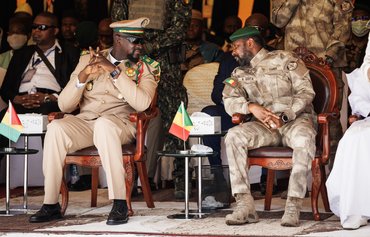NOUAKCHOTT, Mauritania -- Security specialists have criticised Mali's recent release of two "Islamic State of Iraq and Syria" (ISIS) elements, saying the move signals a change in approach that will have dire consequences for the region.
Mali freed at least two extremists from ISIS in the Greater Sahara (ISIS-GS) in a prisoner exchange, a security official and two politicians told AFP on July 8.
The Sahel country's military released Oumeya Ould Albakaye and Dadi Ould Cheghoub, flying them from Bamako to the Gao region in the north, the security official said.
One of the politicians, an elected official in Gao, said at least three extremists were brought there on a military plane from Bamako.
All three sources said the operation was part of a prisoner exchange.
A fourth person, another security official, would not go so far but said a "gesture" was made "to protect the lives of our compatriots in mortal danger". He did not provide details.
Malian security and diplomatic sources cited by Radio France International (RFI) said the deal was made in exchange for a commitment by ISIS-GS not to attack territory controlled by Mali's provisional government.
Albakaye, an explosives specialist, was captured by French forces in June 2022, before France withdrew its troops.
A security source who asked not to be named told AFP at the time that he had once been seen as a potential successor to former ISIS-GS leader Adnan Abu Walid al-Sahrawi, who was killed by French forces in August 2021.
A regional chief commanding the areas of Gourma in Mali and Oudalan in neighbouring Burkina Faso, he was responsible for a large number of abuses against civilians in those countries, the military said last year.
Dadi Ould Cheghoub, also known as Abou Dardar, was arrested by French forces in June 2021, near the tri-border region between Mali, Niger and Burkina Faso.
Mali has been battling a security crisis since extremist and separatist insurgencies broke out in the north in 2012.
Armed groups have carried out widespread killing, rape and looting in northeast Mali this year, forcing thousands to flee, according to a July 13 Human Rights Watch (HRW) report.
The HRW report documented six attacks in the Gao region and two in Menaka between January and June, with unconfirmed reports from aid workers and witnesses suggesting hundreds of civilians died.
Tens of thousands reportedly fled.
A risky move
Anger at the government's failure to stem the violence helped spark two coups in 2020 and 2021. The ruling junta has broken ties with traditional ally France and turned towards Russia.
Mali's latest move is aimed at shoring up control of its territory, as authorities grapple with security threats on multiple fronts, say experts.
Mali's military leaders, who seized power in 2021, invited the Russian mercenary Wagner Group to provide an estimated 1,000 fighters to provide security, prompting France to withdraw its forces.
The United Nations Multidimensional Integrated Stabilisation Mission in Mali (MINUSMA) also is set to withdraw by the end of December after a request from the military government.
Mali's release of the two ISIS leaders can be viewed in the context of "the failed rebellion by the Wagner Group [in Russia] and its repercussions on the stability of the Malian state", terrorism researcher Mohamed Bouchikhi told Al-Mashareq.
The ruling military council bet on the support of the Wagner Group, and behind it Russian diplomacy, Bouchikhi said.
That support is now in question after Wagner Group leader Yevgeny Prigozhin's unsuccessful march on the Kremlin in June.
The rebellion has raised questions over Mali's partnership with Russia and has prompted authorities to "explore new ways to deal with the security emergencies in the country", Bouchikhi said.
The decision to release the leaders of ISIS-GS is a message to other groups that the door is open to negotiations, he added.
Mali's rulers also are trying to control areas where ISIS-GS has influence, including in the Menaka region and near the border with Niger, and fill the security vacuum created by the withdrawal of the MINUSMA forces, he said.
But an agreement between Mali's rulers and ISIS will not bring security to Mali or its neighbours, according to Algerian security analyst Qasi Ras al-Maa.
"This move has increased fears in neighbouring Niger... that the ISIS-Bamako agreement will lead to the terrorist group intensifying its attacks on them," he said.
The move also could exacerbate conflict between ISIS and al-Qaeda affiliate Jamaat Nusrat al-Islam wal Muslimeen (JNIM), he added.
"The decision by the military government in Mali carries many risks," he said.

![A member of the Malian special forces stands guard during a January 20, 2022, ceremony in Kati. [Florent Vergnes/AFP]](/cnmi_am/images/2023/07/21/43083-Mali-special-forces-600_384.jpg)






